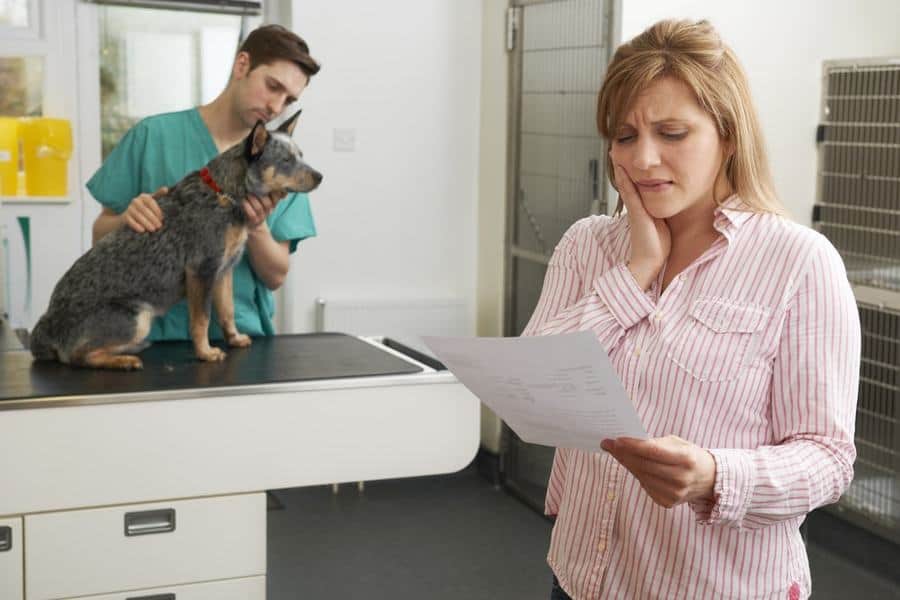“This post contains affiliate links, and I will be compensated if you make a purchase after clicking on my links.”
Most pet owners are well aware that their four-legged friends can be expensive at times. From toys and food to medical care, the typical pet owner spends about $600 per year for a cat, and about $500-$1000 for a dog.
Thankfully, when you know what to expect, you can budget for those things. You might even put a bit more in your pet budget if you like to spoil your furry family member.

But, what happens when a medical emergency strikes? Like people, pets can have health issues in an instant. Whether they get sick, injured, or develop a serious illness, unexpected veterinary care can range from $800-$1,500, depending on where you live. Most people aren’t prepared for that kind of sudden expense.
So, what can you do to make sure your furry friend gets the care they need, whenever they need it? How can you be prepared for unexpected vet bills?
Financial Planning
Financial planning is an effective way to manage your money. It goes beyond budgeting and allows you to plan for everything in your life, including your everyday and long-term expenses, savings, and investing. Because financial planning tends to focus on the future, it can also help you with unexpected financial emergencies – including vet bills.
There are plenty of benefits to financial planning, including:
- Increased confidence in your finances
- Better spending habits
- A stronger investment portfolio
You don’t need to be a numbers guru or champion investor to get started. Your financial plan should include your goals, tracking of your cash flow, and putting money away safely for emergencies. There’s a difference between saving for investments or retirement and having an emergency fund. When you plan properly, you’ll be able to set up both while still maintaining your current lifestyle and living comfortably.
Pet Insurance
Pet insurance is becoming increasingly popular, and for good reason! You probably wouldn’t want to go to the hospital yourself without insurance, or you would be left with thousands of dollars to pay on your own.
Pet insurance works the same way. If your furry family friend has to go to the vet unexpectedly, you don’t want to be slapped with a big bill. Thankfully, there are various types of pet insurance you can look into to find a plan that fits your needs.
With pet insurance, you take your animal to the vet whenever there’s an emergency, pay the bill, send in the claim, and get your money back quickly.
It’s normal to wonder if pet insurance is really “worth it”. After all, the chances of your dog, cat, or other family pet getting into an emergency situation are slim. But, the big benefit of pet insurance is consistency. You can budget for it each month. So, if your pet gets sick or into an accident and the vet bill is $10,000, you won’t have to face an unexpected expense, since your insurance will take care of it.
Additionally, if you have a pet that tends to get sick a lot or has been diagnosed with an illness, pet insurance is most definitely worth it. While that might not be “unexpected,” it’s something to think about!
Pawp covers up to $3,000 in an emergency
Assistance Programs
If an emergency arises with your pet and you’re not sure how you’re going to foot the bill, don’t panic. Thankfully, there are resources available that can help you in times of need. No one should have to deny their pet the care they need because of the cost.
Resources across the country can provide financial assistance. Some organizations work specifically with certain types of animals. Other cover pets with certain illnesses and ailments. Some of the most popular programs include:
- The Big Hearts Fund (for canine and feline heart disease)
- The Dog & Cat Cancer Fund
- Canine Cancer Awareness
- Cats in Crisis
- Labrador Lifeline
- The Pet Fund
Don’t be afraid to do a little bit of digging. This is only the tip of the iceberg when it comes to organizations that can provide you with financial assistance.
Additionally, consider working with your vet to set up a payment plan. Most veterinarians get into the practice for the love of animals. While they still need to be paid, there are many out there who are willing to work with pet owners so the cost of care doesn’t become a burden. Payment options can be a great way to make sure your pet is properly cared for while you pay what you can, when you can, based upon an agreement.
With that in mind, though, it’s always important to do what you can ahead of time to make sure you’re prepared for anything. By planning, budgeting, setting money aside, and considering pet insurance, you can feel more confident that an unexpected trip to the vet won’t cause excess financial strain for you. It’s impossible to predict if/when your pet will need emergency veterinary care. But, you can take comfort in knowing they can receive that care without question because you’re financially prepared.

Jori Hamilton is a writer from the pacific northwest.
You can follow her on twitter @HamiltonJori and see
more of her work at writerjorihamilton.contently.com.


















